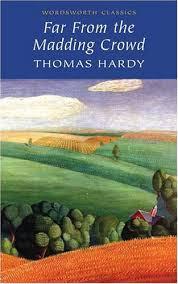 It’s always hard to review a classic, and especially a Thomas Hardy novel, since he’s one of my favorites.
It’s always hard to review a classic, and especially a Thomas Hardy novel, since he’s one of my favorites.
First, some background: It was published in 1874, Hardy’s fourth novel and first literary success. It presents many of the themes of quiet, rural life that Hardy is well-known for. The title comes from a poem by Thomas Gray, Elegy Written in a Country Churchyard (1751):
Far From the madding crowd’s ignoble strife
Their sober wishes never learn’d to stray;
Along the cool sequester’d vale of life
They kept the noiseless tenor of their way.
I struggled with this book more than his others, maybe because I had a harder time liking Bathsheba, or maybe because I had mixed feelings about the way Hardy writes about her. Still, I always love Hardy’s focus on nature, and how the natural world reflects the passions of the people that live in it.
Hardy tends to create strong female characters, and this is particularly true of Bathsheba. She manages a farm when no one thinks women can do that kind of work. She’s a good manager and knows what she’s doing – and more importantly, she knows what she doesn’t know, and hires good people to get the work done.
In this scene she’s addressing her men and she says:
Now mind, you have a mistress instead of a master. I don’t yet know my powers or my talents in farming; but I shall do my best, and if you serve me well, so shall I serve you.
I shall be up before you are awake; I shall be afield before you are up; and I shall have breakfasted before you are afield. In short, I shall astonish you all.
She’s independent, and doesn’t seem tied to social mores. She goes where she wants, when she wants. Like Austen’s Emma Woodhouse, she doesn’t care about getting married, because she doesn’t need to. But she can also be vain, flirtatious, and careless of people’s feelings.
Gabriel Oak is a farm owner himself at the beginning of the novel, but he falls into ruin and ends up working as a shepherd for Bathsheba. As a farmer he wanted to marry her, but Bathsheba has no feelings for him, and as a shepherd he’s well beneath her status.
Enter Farmer Boldwood, who owns the farm next door. Bathsheba is also uninterested in him, but a marriage to him at least makes good business sense. Boldwood is a stern, unemotional sort, until Bathsheba toys with his feelings and makes him fall crazy in love with her.
Then comes Sergeant Troy, who manipulates Bathsheba’s emotions and she finds herself entranced by him. Like another Hardy heroines, Eustacia Vye, Bathsheba’s weakness is that she’s bored by the sincerity of someone telling her they love her. It’s the chase, the game that entices her. Which of course is to her misfortune.
When a strong woman recklessly throws away her strength she is worse than a weak woman who has never had any strength to throw away. … She has never had practice in making the best of such a condition. Weakness is doubly weak by being new.
The first half of this novel can be a slow read at times. It’s a lot of description of farming, and then a lot of Hardy scolding Bathsheba for her carelessness. But I love the way Hardy writes about the English countryside, and that the land and the work of tending it play such a huge part in his novels.
As I got farther into the book, I got more invested in the characters of Boldwood, Oak, and Bathsheba. I liked how Hardy lets these characters get to know each other over time. They build genuine friendships even in the midst of emotional heartache and the challenges of running a farm.
Bathsheba may not be the most honorable character, but I admired her strength and I sympathized with her struggles. She comes to learn a lot about herself in the course of this book.
Another Hardy book I’m glad to have read. Look for the movie version coming out in 2015, starring Carey Mulligan as Bathsheba.
This books counts towards the Classics Club and Back to the Classics challenges.

